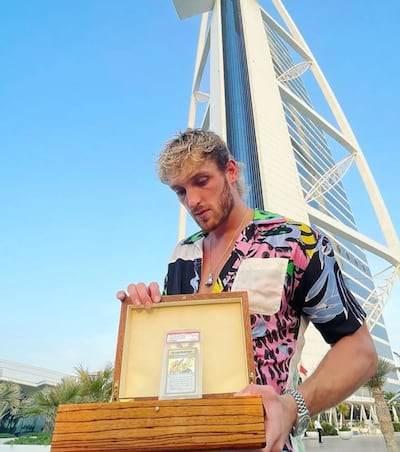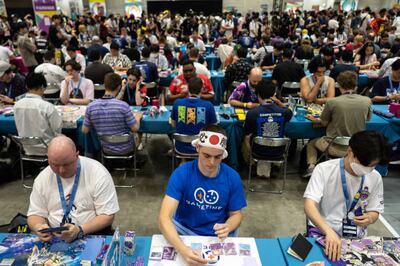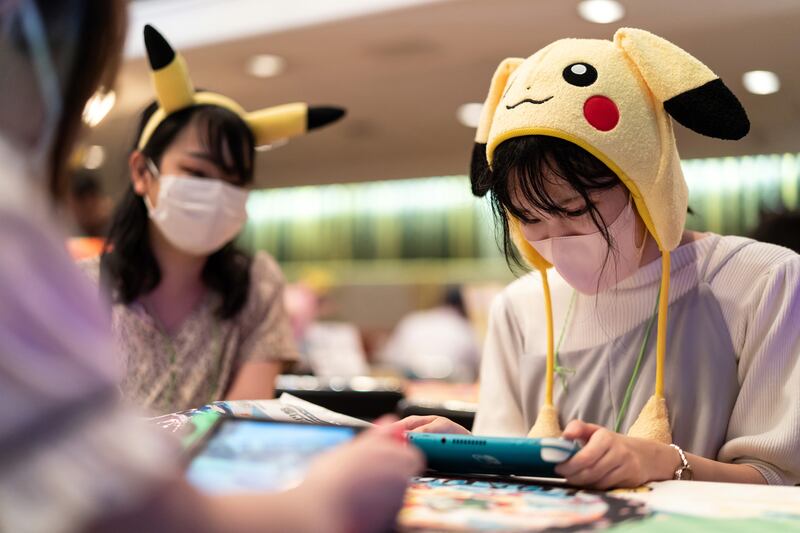Dressed up and ready for battle, around 10,000 Pokemon fans are descending on Yokohama, Japan, looking for fun – and high-value collector's cards.
Since the launch of Pokemon cards in 1996 following the hit computer game of the same name, an astounding 53 billion have been printed.
Almost 30 years on, the card game remains hugely popular as contestants take each other on with cards representing the monsters and their different attributes.
The Pokemon World Championships, being held this weekend in Japan for the first time, will see the world's best players of the video and the card game battle it out for cash prizes at an event attended by thousands.
"I have been playing since I was a kid," said Ajay Sridhar, 33, who travelled from New York to attend with his cards. "It's just the competition, it's the community ... A lot of my oldest friends I've met through Pokemon."
Gilbert McLaughlin, 27, from Scotland, added: "It's kind of like chess, where if you didn't play chess and you were watching a high-level chess match, you wouldn't know what was going on.
"But once you get to a certain skill level, there is a lot of depth and complexity to it."
Catch 'em all
Ranging from Pikachu the mouse to Jigglypuff the balloon to the jackal-headed Lucario, there are now more than 1,000 different Pokemon characters, with new "generations" released every few years.
While they have always been swapped and collected, the cards' value has exploded in recent years, not just among fans of the game but also among investors with little or no past interest.
Factors determining value include the cards' rareness, the character (Mew, Mewtwo, Pikachu and Charizard tend to be more valuable) and the artist, who is indicated on the card.
Websites have sprung up dedicated to helping people understand the dizzying array of different cards and their myriad markings, complete with charts showing their value over time.

The most expensive ever sold was in 2021 when US YouTuber Logan Paul paid – in a Dubai hotel room to a "mystery" seller – $5.27 million for a supposedly unique, mint-condition "PSA Grade 10 Pikachu".
The following year, Logan, 28, hung the card – inside a protective plastic case attached to a gold chain – around his neck at a WWE wrestling event in Texas.
Fisticuffs
Hiroshi Goto is an expert in Pokemon cards who has written a book with advice on how to make money from them.
He said that when he ran a shop selling the cards in the 2000s, his customers were mostly "schoolkids with their dads taking part in tournaments together".
But since the 20th anniversary in 2016, "the perception of cards evolved into being not just toys for children but also items appreciated by adults, collector's items with a tangible value", he said.

Demand is such that the Pokemon Company has had to increase production.
in Japan and the US, there have been instances of physical fights, including one outside a shop in the Japanese city of Osaka last month that went viral on social media.
There have been cases of shops selling Pokemon cards being broken into in normally low-crime Japan in recent months.
The gold rush has also sparked a boom in fake cards.
Paul, for instance, paid $3.75 million in 2021 for a "sealed & authenticated" box of first-edition booster packs that turned out to contain GI Joe cards instead, according to one of his videos.
Bargains
On the sidelines in Yokohama, collectors were busy swapping and selling their cards, including Jeffrey Ng, happy after buying 10 cards for $1,700. He now hopes to sell them for a profit.
"Conventions like this one are a good place to meet other collectors," he said.
All cards are painstakingly conceived and designed in the same place, the Tokyo offices of Creatures Inc, which along with Nintendo and Game Freak own the Pokemon Company.
Creatures executive Atsushi Nagashima said while the firm was "very happy" about the success of the cards, "that doesn't change how we do our job".
Creatures employs 18 testers who spend their working days playing Pokemon to make sure that the new cards fit harmoniously with the vast number of existing ones.
"We never hire people from competitions," said Kohei Kobayashi, another manager at Creatures. "We want to leave the good players where they are, there where they shine."






